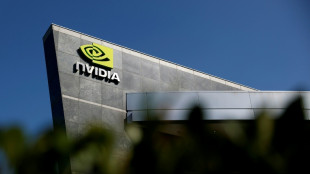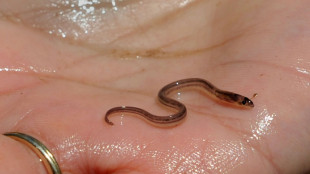
-
 Trump hosts Saudi prince for first time since Khashoggi killing
Trump hosts Saudi prince for first time since Khashoggi killing
-
Tonga's Katoa out of NRL season after brain surgery

-
 Japan warns citizens in China over safety amid Taiwan row
Japan warns citizens in China over safety amid Taiwan row
-
In Somalia, a shaky front line barely holds back the 'dogs of war'

-
 Shares in 'Baby Shark' studio jump on market debut
Shares in 'Baby Shark' studio jump on market debut
-
Thunder breeze past Pelicans, Pistons overpower Pacers

-
 Grieving Cowboys remember Kneeland, defeat Raiders
Grieving Cowboys remember Kneeland, defeat Raiders
-
Loaf behind bars: Aussie inmate says Vegemite a human right

-
 In film's second act, 'Wicked' goes beyond Broadway musical
In film's second act, 'Wicked' goes beyond Broadway musical
-
Asian markets track Wall St down with Nvidia, US jobs in view

-
 Scott Boland: the best 'spare' fast bowler around
Scott Boland: the best 'spare' fast bowler around
-
Fire and Ashes: England bank on fast bowling barrage in Australia

-
 North Korea says Seoul-US sub deal will trigger 'nuclear domino' effect
North Korea says Seoul-US sub deal will trigger 'nuclear domino' effect
-
Education for girls hit hard by India's drying wells

-
 Haitian gangs getting rich off murky market for baby eels
Haitian gangs getting rich off murky market for baby eels
-
Trump says will talk to Venezuela's Maduro, 'OK' with US strikes on Mexico

-
 Oscar Piastri wins Australia's top sports honour
Oscar Piastri wins Australia's top sports honour
-
'Severely restricted': Russia's Saint Petersburg faces cultural crackdown

-
 Polish PM denounces 'sabotage' of railway supply line to Ukraine
Polish PM denounces 'sabotage' of railway supply line to Ukraine
-
UK toughens asylum system with radical overhaul

-
 Carney's Liberals pass budget, avoiding snap Canada election
Carney's Liberals pass budget, avoiding snap Canada election
-
LeBron back in training, edges closer to Lakers return

-
 Climate talks run into night as COP30 hosts seek breakthrough
Climate talks run into night as COP30 hosts seek breakthrough
-
Germany and Netherlands lock up World Cup spots in style

-
 Germany's Woltemade hopes for 2026 World Cup spot after scoring again
Germany's Woltemade hopes for 2026 World Cup spot after scoring again
-
Germany 'send message' with Slovakia rout to reach 2026 World Cup

-
 Trump unveils fast-track visas for World Cup ticket holders
Trump unveils fast-track visas for World Cup ticket holders
-
Netherlands qualify for World Cup, Poland in play-offs

-
 Germany crush Slovakia to qualify for 2026 World Cup
Germany crush Slovakia to qualify for 2026 World Cup
-
Stocks gloomy on earnings and tech jitters, US rate worries

-
 'In it to win it': Australia doubles down on climate hosting bid
'In it to win it': Australia doubles down on climate hosting bid
-
Former NFL star Brown could face 30 yrs jail for shooting case: prosecutor

-
 Fate of Canada government hinges on tight budget vote
Fate of Canada government hinges on tight budget vote
-
New research measures how much plastic is lethal for marine life

-
 Mbappe, PSG face off in multi-million lawsuit
Mbappe, PSG face off in multi-million lawsuit
-
EU defends carbon tax as ministers take over COP30 negotiations

-
 McCartney to release silent AI protest song
McCartney to release silent AI protest song
-
Stocks tepid on uncertainty over earnings, tech rally, US rates

-
 Louvre shuts gallery over ceiling safety fears
Louvre shuts gallery over ceiling safety fears
-
'Stranded, stressed' giraffes in Kenya relocated as habitats encroached

-
 US Supreme Court to hear migrant asylum claim case
US Supreme Court to hear migrant asylum claim case
-
Western aid cuts could cause 22.6 million deaths, researchers say

-
 Clarke hails Scotland 'legends' ahead of crunch World Cup qualifier
Clarke hails Scotland 'legends' ahead of crunch World Cup qualifier
-
S.Africa says 'suspicious' flights from Israel show 'agenda to cleanse Palestinians'

-
 South Korea pledges to phase out coal plants at COP30
South Korea pledges to phase out coal plants at COP30
-
Ex-PSG footballer Hamraoui claims 3.5m euros damages against club

-
 Mbappe, PSG in counterclaims worth hundreds of millions
Mbappe, PSG in counterclaims worth hundreds of millions
-
Two newly discovered Bach organ works unveiled in Germany

-
 Stocks lower on uncertainty over earnings, tech rally, US rates
Stocks lower on uncertainty over earnings, tech rally, US rates
-
Barca to make long-awaited Camp Nou return on November 22


Europe's Euclid space telescope releases first images
The first images from Europe's Euclid space telescope were released on Tuesday, showing a nebula resembling a horse's head, never-before-seen distant galaxies and even "circumstantial evidence" of elusive dark matter.
Euclid blasted off in July on the world's first-ever mission aiming to investigate the enduring cosmic mysteries of dark matter and dark energy.
It will do so partly by charting one third of the sky -- encompassing a mind-boggling two billion galaxies -- to create what has been billed as the most accurate 3D map of the universe ever.
After joining fellow space telescope James Webb at a stable hovering spot around 1.5 million kilometres (more than 930,000 miles) from Earth, Euclid started sending back its first observations.
European Space Agency chief Josef Aschbacher said in a statement that Euclid's first five images were "awe-inspiring and remind us of why it is essential that we go to space to learn more about the mysteries of the universe".
They include an image of the Horsehead Nebula and part of the famous Orion constellation, as well as spiral and "irregular" galaxies.
But Euclid project scientist Rene Laureijs told AFP that the most exciting for the team was an image of the Perseus Cluster, a massive distant collection of more than a thousand galaxies.
Lurking in the background of the cluster is more than 100,000 additional galaxies, some of which are 10 billion light years away and have never been seen before, according to the ESA.
- 'Dark universe detective' -
Jean-Charles Cuillandre, another scientist working on Euclid, told AFP that Euclid is different to other space telescopes because it takes in a very wide field of view, "like never before seen in the history of astronomy."
In comparison, the Webb telescope "looks at the sky through the eye of a needle," he said.
This wide view means it can capture such broad images extremely quickly -- the five new images only took around eight hours of the telescope's time.
Images from another 16 hours -- making up a full day -- will be released in January.
The ESA has dubbed Euclid its "dark universe detective," charged with investigating why 95 percent of the universe appears to be made up of dark matter and dark energy, which we know very little about.
"Dark matter pulls galaxies together and causes them to spin more rapidly than visible matter alone can account for; dark energy is driving the accelerated expansion of the universe," explained ESA science director Carole Mundell.
Euclid's early images have already pointed towards "circumstantial evidence" of dark matter, according to Laureijs.
For example, he said it was "surprising" that Euclid did not spot stars trailing globular cluster NGC 6397, a collection of hundreds of thousands of stars.
"One of the theories is that there might be dark matter around the globular cluster, which keeps all the stars together," Laureijs said.
- Walk back in time -
By capturing light that has taken 10 billion years to reach Earth's vicinity, Euclid also hopes to better understand how dark energy has driven the universe's expansion since the Big Bang 13.8 billion years ago.
Once Euclid has collected enough data, the scientists plan to plot out a 3D map -- the third dimension being time.
Laureijs said the map would allow people to "walk through a part of the sky and go 10 billion years back in time".
But that will have to wait for future data releases over the planned six-year mission.
It has not been all smooth sailing for Euclid.
When the scientists first started their observations, they found that cosmic rays were disturbing the telescope's extremely sensitive fine guidance sensor.
The spacecraft's software had an algorithm that was "fooled" by the cosmic rays, Laureijs said.
However the team on the ground managed to upload a new algorithm to the spacecraft. "Now it works flawlessly," Laureijs said.
There was also a problem with sunlight reflecting off a thruster boom which required rotating the telescope a little, he added.
A series of scientific papers analysing what is in the five new images will be published soon, according to the ESA.
P.Tamimi--SF-PST




